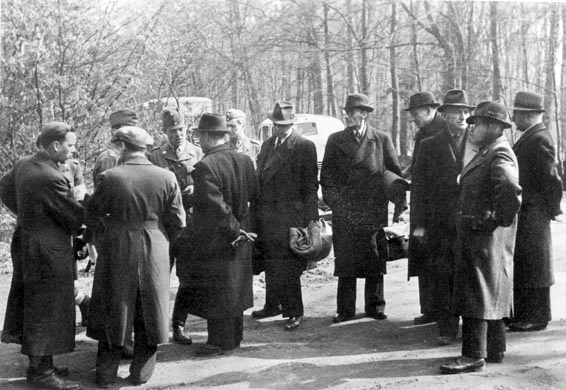The Nazi Police State
The Nazi Police State were introduced to make sure that the people of Germany were kept under control or face consequences. They were controlled by Heinrich Himmler and his secret police, better known as the Gestapo, were able to do as they wished. The loyalty of children could be developed by a policy of indoctrination through education and the Hitler Youth movement - time and planning over these areas would bring Hitler a suitable reward.
With adults, some of them openly supported Hitler, shown from the results of the election in March 1933. But this election also showed that quite a lot of Germans did not support Hitler and the Nazi party. So in order to deal with them, the Nazis developed an intimidation policy and anything negative heard by the Nazi officials could have major consequences. The Police State carried out the rule that if you did not say anything, nothing would happen to you - so if you did not like the way the country was being run, you kept it to yourself or paid a great price. Since nearly 17 million people had not voted for the Nazis or the Nationalist in the election, a major police force was used to keep them observed and under control.

Control was maintained by propaganda strategies and intimidation:
- Government (political)
- Religion (social)
- Culture (social)
- Work (working)
- Education and youth (working)
- Terror (control method)
- Propaganda (control method)
The police were also allowed to arrest people just on suspicion that they were going to do something wrong, which gave them enormous power. All local police units would draw up a list of people who were suspected to be ‘Enemies of the State’, and this was given to the Gestapo. Their leader (Reinhard Heydrich) was one of the most feared men in Nazi Germany along with Heinrich Himmler who was his immediate chief - both of them ran their branches in a very tough way.
If you were arrested by the police or Gestapo you had less than three minutes to pack clothes and say your goodbyes before being sent to the nearest police cell. People in custody had to sign a Form D-11 which was an ‘Order for Protective Custody’ and meant they agreed to go to prison. If you did not sign it you were beaten or your signature was forged by officers. Once the form was signed, you would be sent to a concentration camp and your stay was decided by the authorities. Usually it was when you had appeared to ‘learn your lesson’ and would behave appropriately outside of prison.
Concentration camps were famous for being horrific and barbaric places. Deaths before 1939 were not that common - once people were released they would advertise to others that the camps were not places that you wanted to be in; another method by which the Nazis made sure people kept their opinions to themselves.
Anyone considered to be a political threat was arrested, along with those who made jokes about Hitler, ‘work shy’ people, people who only took guidance from the Bible and didn’t follow Nazi ideas, homosexuals and habitual criminals.
In 1936, the Gestapo Law meant that the Gestapo activities were free from review by any courts of law - this meant that the Gestapo became a law unto themselves.
MLA Citation/Reference
"The Nazi Police State". HistoryLearning.com. 2026. Web.
